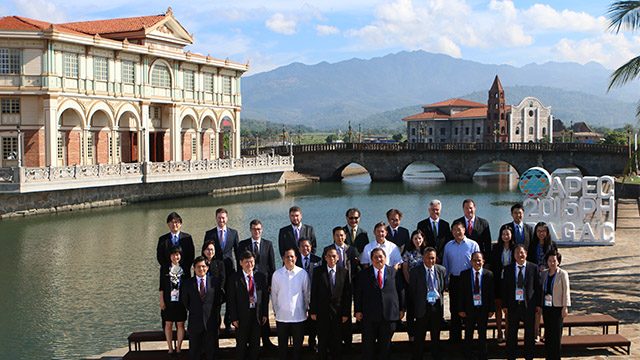SUMMARY
This is AI generated summarization, which may have errors. For context, always refer to the full article.

MANILA, Philippines – Senior finance officials of the Asia-Pacific Economic Cooperation (APEC) on Friday, June 12, closed meetings with the Philippines getting firmer support for the Cebu Action Plan (CAP) aimed at strengthening finances of economies.
Finance Undersecretary Gil Beltran said in a statement that his office is “encouraged by the support” of the member economies for the proposed Cebu Action Plan. The action plan is a 4-pillar move to make economies more transparent, resilient and integrated. It is expected to boost infrastructure financing, too.
“Each of the 4 pillars of the Cebu Action Plan is firmly aligned with the challenges and opportunities of the common future we face. I thank each delegation for their hard work and resolute commitment in refining a CAP that will ensure shared prosperity across the Asia Pacific,” Beltran said.
Four pillars will mark the Cebu Action Plan to be approved during the Finance Ministerial Meeting in September: financial integration, fiscal transparency and reforms, financial resiliency, and infrastructure development and financing.
Senior finance officials from across the Asia Pacific refined the CAP throughout the two-day meeting, drawing on insights provided by international financial institutions on the global economic outlook. During the last day of the meeting, APEC economies found each pillar of the CAP attuned to areas that need to be addressed to achieve sustainable, inclusive growth.
Finance Secretary Cesar Purisima said: “It is perhaps fitting that one of CAP’s milestones lies in a place where freedom has been fought for ever so bravely.”
Purisima thanked the senior finance officials and said: “I look forward to the Finance Ministerial Meeting in September. The Cebu Action Plan is both a strategic response to current opportunities and challenges, and a lasting vision for the future.”
Pro-active approach
With falling oil prices and changes in monetary policies shaping the region’s outlook, Odd Per Brekk of the International Monetary Fund said there is rising demand to support the growth and recovery efforts among economies in the Asia Pacific by boosting infrastructure investments and undertaking structural reform to boost potential economic output.
Arjun Goswami of the Asian Development Bank underscored how improving financial inclusion by lowering the cost of sending remittances is important as developing APEC economies received $135 billion remittances annually in the past 5 years.
The Cebu Action Plan was commended for its proactive approach to remittance cost reduction, the finance department said in the statement.
Relatedly, the CAP’s emphasis on developing capital markets to enhance financial resiliency was affirmed by the ADB as a way to address the region’s vulnerabilities to sudden reversals of capital flows and disasters.
“With a disaster-prone region with cost of damages reaching $1.2 trillion over the last decade, the CAP is a robust response to enable member economies to absorb shocks better, through strengthening regional safety nets, cooperating in disaster management and risk financing, and building deeper financial markets,” the statement read.
The ADB said urban populations in APEC are projected to increase rapidly from 1.8 billion in 2013 to 2.4 billion people by 2050.
The ADB also earlier projected a $1 trillion per year infrastructure financing gap for 2010-2020, in which the private sector is expected to contribute 40%. – Rappler.com
Add a comment
How does this make you feel?
There are no comments yet. Add your comment to start the conversation.